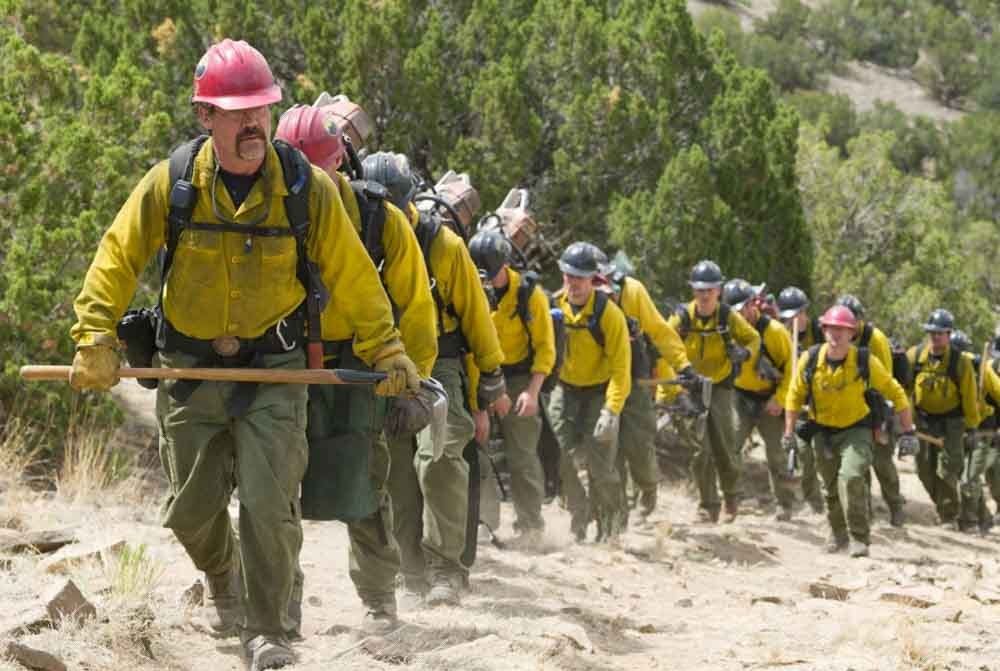This early, well-calibrated, subtly acted pairing is only the first in a film brimming with characters who plainly enjoy each other’s company and/or model a productive mentor/mentee relationship. For Marsh, that man he admires is chief Duane Steinbrink (Jeff Bridges), an avuncular old pro who counsels Marsh to sand down his unpleasant edges. Marsh has a team full of proteges who gladly accompany him into the flames, particularly the struggling Brendan McDonough (Miles Teller), a young man struggling with drugs and hoping to better himself so he can be presentable to his infant daughter and her mother (Natalie Hall). Only the Brave resembles a sports movie for large chunks of its first hour, which finds Brendan getting acclimated to the various jabs and ripostes from a spirited group of young men before finally getting ‘baptized,’ as Marsh calls it, with his first fire, the first of several that Kosinki and cinematographer Claudio Miranda film with terrible majesty.
In its second hour, the film takes a turn into a war film as the Granite Mountain Hotshots receive a promotion that transforms them from a group of municipal firefighters, who largely function as backup, into a hotshot crew on the front lines. Kosinski and the writers do an excellent job on the competence porn front, supplying just enough exposition and visual guides to show what hotshot-ing requires, what the crew’s tactics look like, and how quickly things can take a turn. The film contains none of the stoppages of momentum that accompany characters explaining what they already know to each other for the benefit of the layman viewer.
As the professional stakes rise for the crew, the personal stakes hit a crescendo as well, particularly for the Marsh’s. Subtle winces from Amanda brought on by unmalicious comments build up in her until they explode in a way that feels true, while her issues are also revealed to come from a real place and not some forced second act twist from the nagging wife trope who wants her husband to quit his meaningful job. The film also withholds key information about Marsh himself until it becomes appropriate and natural for it to come out, and it admirably reframes much of what is known about his character.
As deft as the film is with its characterization, the camaraderie that Kosinki is able to engender in his cast raises Only the Brave to the next level. It would be so easy for the film to go with Animal House shorthand when it comes to the crew’s banter. Insert some language about sexual conquest, a drinking contest, a little gay panic, and you’re done. Instead, the cast and crew go a much more respectable route without losing the readily apparent affection everyone shares with each other. Nothing is mean-spirited, save for some rude hazing that Taylor Kitsch’s (who has maybe never been more appealing, including in Friday Night Lights) Chris Mackenzie inflicts on Brendan, hazing that is quickly smacked down by Marsh’s second Jesse Steed (James Badge Dale). The men often profess their love for each other, sometimes accompanied by a forehead kiss. Brendan and Chris, who become roommates, share a funny, panicked night of infant care that laughs with their over-preparedness instead of at the patronizing comic scenario of men watching their children. Even Marsh, displaced from the friendly joshing as the crew’s leader, is shown to have cracks in the wall of stoicism that he projects. Thanks to Brolin’s fine-tuned vocal control, the tiniest catch emerges during his speech at the crew’s celebratory BBQ, revealing Marsh to be a man capable of emoting beyond pain and anger in front of his comrades.
That speech includes the Granite Mountain Hotshots’ motto of ‘To be rather than to be seen.’ This applies to the crew aspirationally, but it sadly applies to the film in a literal fashion, in that Only the Brave was not a commercial success. However, Kosinski, Brolin, and the rest should be immensely proud of their effort, an understated and beautiful depiction of men at their best. A-

 RSS Feed
RSS Feed